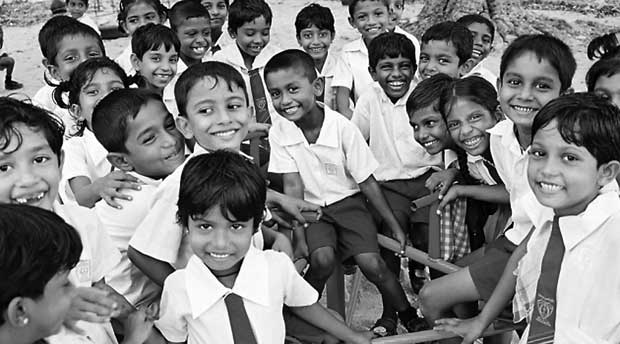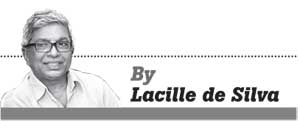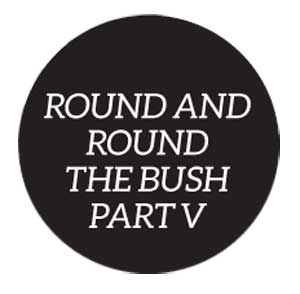Reply To:
Name - Reply Comment
Last Updated : 2024-04-27 00:40:00

Sri Lanka has been recognized as a country with a high literacy rate. These statistics however do not reveal the factual situation. Reduced government spending, absence of national educational policy, inefficiency and politicization have contributed largely to the destruction of an excellent human capital development system – the Free Education Scheme, which was called the “Pearl of Great Price”.
In the year 2001, according to the Department of Education, 6.19% of children in the age group of 5 - 14 had not attended school. Similarly, 22.13% children in the age group of 15 – 16 had also not done schooling. World Bank in 2005 had stated that 18% of the children have failed to complete their education up to grade 9. According to UGC statistics, in the years 2009/10 – 82.80%, 2010/11 – 84.55%, 2011/12 – 79.56% percent eligible of students had not been able to gain admission to universities. A grave disgrace indeed!

The Youth Commission had dealt with the need to provide increased educational prospects together with increased job opportunities. Dr. C.W.W. Kannangara, as the Minister of Education, (1931-1947) during the State Council days, had endeavoured remarkably well that there should be equal opportunities to rural and urban communities throughout the Island. The Maha Sangha had extended formidable strength to the Minister at the time for these reforms.
Isn’t it sad that rural schools now have very little in common compared to the facilities in prestigious schools in urban areas? There had been a glaring imbalance between urban and rural education created. The urban schools attracted more resources and better equipped learning facilities. They are managed with the funds provided by the government, with better teachers, computers, foreign languages etc. Doesn’t this mean that the children of affluent families enjoy more benefits due to the system than those from humble backgrounds?
Rural schools played a crucial role prior to the 1970s. After the setting up of Provincial Councils, rural schools were brought under the provincial administration. Education authorities are required to provide a primary school within 2 km and a secondary school within 5 km. However, poorly equipped and neglected rural schools had not been able to retain their students and were closed down depriving children in poor areas access to education.
Do you know in 2006 – 14; 2007 – 37; 2008 – 17 and in 2009 - 103 schools had been closed down? It has been revealed that 25.97% schools do not have teachers’ toilets and 26.95% have students’ toilets!. Around 20% schools do not have water and electricity. Neglecting the education and reduced funding jeopardizes the future.We need to correct ourselves. Shouldn’t we immediately increase the allocation by 50%? It has been less than 3% from the GDP for education for the past couple of decades.
Our rulers have disregarded the grievances presented before the Commission by the youth. They continue to disburse funds aimlessly without investing sufficiently in education. Education is in crisis due to modern politicians. Shouldn’t we establish and implement consolidated principles for education  to protect our youth? Shouldn’t we therefore create a common platform to coordinate work by all relevant actors?
to protect our youth? Shouldn’t we therefore create a common platform to coordinate work by all relevant actors?
American Sociologist Talcott Parsons had described the school as a combination of two bridges. Firstly, the school acts as the bridge between home/family and the wider society. Secondly, it acts as a bridge between childhood and adulthood.
Parsons argues that it is the school that trains children to be part of the wider society and adulthood. He had also said that students learn two specific things in school. These are the values of society, namely, how to be fully-fledged members of the society and the economic skills in order to provide the foundation for a vocation to make a living in the future. According to Parsons, these values create a highly motivated achievement oriented workforce. Margaret Mead had said “Children must be taught how to think, not what to think”.
Youth Commission had urged to depoliticise the system three decades ago. In contradiction to this necessity, politicians used strong arm tactics. Youth therefore seem to be of the view that there are two parallel legal systems, one for those who wield political power, with enough wealth to buy anyone. The other for people without power and resources at their command demanding justice and equality. An eternal struggle?
The Youth Commission report had alluded that the major reasons for the erosion of public confidence in the public sector is due to bribery and corruption. It had added that not only politicians but also the public servants too have been responsible. The voice of the young people had not been heard. They had made it very clear that there was nobody who was interested in their problems. They had complained that politicians were not at all interested in taking corrective measures to resolve youth problems.The Commission had therefore proposed the need to setup a
Youth Ombudsman.
The Commission had pointed out that there was a serious mismatch between education and  employment in the country. There had been frustration and resentment growing causing misery, agony and disenchantment in the youth owing to neglect and lack of funding. Students who drop out after GCE A/L have not been able to secure employment too due to lack of specific job skills.
employment in the country. There had been frustration and resentment growing causing misery, agony and disenchantment in the youth owing to neglect and lack of funding. Students who drop out after GCE A/L have not been able to secure employment too due to lack of specific job skills.
The report had suggested that the structure of education must be reformed as a matter of utmost urgency since “there is something fundamentally wrong with our system of education”. The lack of continuity in education policy between successive governments and even between successive ministers had disrupted the system and even expectations of youth.
The low salaries paid to teachers in schools and universities have adversely affected the quality of education. Teachers unlike in the past, give private tuition and these classes are costly. Doesn’t this mean that teachers neglect their duty? Haven’t they deprived students’ free education which is a birth right of theirs?
The report had also mentioned that the youth unrest would be a permanent feature of our society if the restructuring was not carried out in our education system.They had added “certain type of ad-hoc responses and high degree of bureaucratic lethargy have prevented the education system from responding creatively to the problem of educated youth”.
Dr. C.W.W. Kannangara implemented decades ago educational reforms in order to prepare the youth to become useful products to take the country forward. These reforms had not been merely learning or gathering knowledge. They had been combined with a view to inculcate discipline, integrity, honesty including patriotism.
We have however destroyed Kannangara policies by now totally. We now don’t have elected representatives who could think like Kannangara. The UNICEF has expressed concern over the falling enrolment rates. Do you know according to UNICEF, more boys stop education than girls? Do the children drop out because they cannot afford “hidden” costs such as various contributions sought from poor children?
Prof. A.D.V. de S. Indraratne had said that “Kannangara educational reforms ideally suited the times and have had an overwhelming impact on the national economy and the life of the people. By the time CWW left the State Council, he had been able to leave behind an education system capable of turning out the necessary professional people to man the public service replacing the British expatriates, even though it was not able to produce enough scientific and technical people. Kannangara’s education system was also able to recognise the undeveloped rural abilities with potential for excellence -- like the gems lying embedded and unseen in the soil”.
Let me quote what Dr. C.W.W. Kannangara himself had said in the State Council of Ceylon on May 30, 1944: “In Ceylon, we have the sad spectacle of some people not being able to enjoy the benefits of the vote granted by the Donoughmore Commission. We have to adopt strange devices. With a view to having all these troubles removed, of improving the system, the only thing that can be done is to make our people literate. Illiteracy must be removed at the earliest opportunity. Let us make the best investment we can with our money. Let a large sum be separated – for the construction of the schools that are needed. Any amount of money spent on education will bring a large return. It will make up certainly for the loss that you incur in the first instance”. Dr. Kannangara had further said: “This is opposed by certain sections, some on the ground that if you treat the ordinary villager on the same ground as yourself then in that case there will be no servants available in this country”.
Dr. C.W.W. Kannangara, the then Minister of Education, had felt the need that a change of heart was needed to take the country forward particularly by providing free education without discrimination to every single citizen in all communities.
The central schools established island-wide by Dr. Kannangara paved the way for equitable distribution of education. The scholarship scheme offered access to secondary and higher education to lower income groups. If not for the contribution made by Dr. Kannangara, we could not have been able to boast of higher literacy rate in Sri Lanka. Dr. Kannangara took steps with the approval of the then State Council of Ceylon to set up teacher training, grading of primary and post-primary schools, the medium of instruction in primary schools, the provision to compel attendance at school from 5 to 16 etc.long before UNICEF prescribed such requirements. . University students are now protesting in regard to numerous issues including SAITM. Shouldn’t the government therefore come up with a more open and transparent policy in regard to private and international schools without delay? Shouldn’t they also consider regulating private degree awarding institutions under a suitable regulatory body since a large number of citizens are willing to pay for education of their children in private schools and universities. It will put an end to our valuable foreign exchange going out and resolve several burning issues too.
We are signatories to the “World Declaration on Education for all” in 1990. In the present context, accelerated technological improvements, and increased educational support and development are crucial because high level researchers, effective managers, engineers, technicians, accountants etc. are needed more and more to take the country forward. Without them we would always fail in future too.

Add comment
Comments will be edited (grammar, spelling and slang) and authorized at the discretion of Daily Mirror online. The website also has the right not to publish selected comments.
Reply To:
Name - Reply Comment
US authorities are currently reviewing the manifest of every cargo aboard MV
On March 26, a couple arriving from Thailand was arrested with 88 live animal
According to villagers from Naula-Moragolla out of 105 families 80 can afford
Is the situation in Sri Lanka so grim that locals harbour hope that they coul